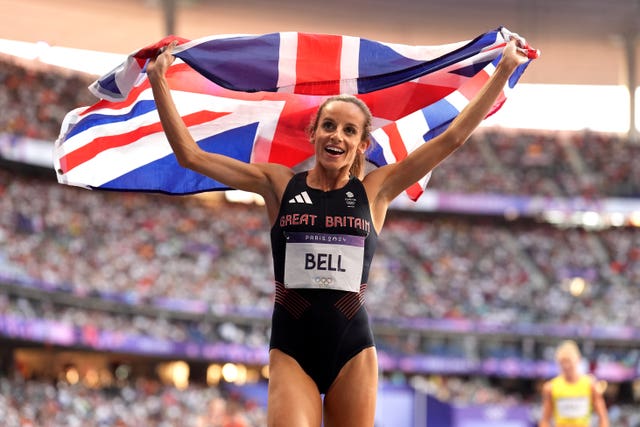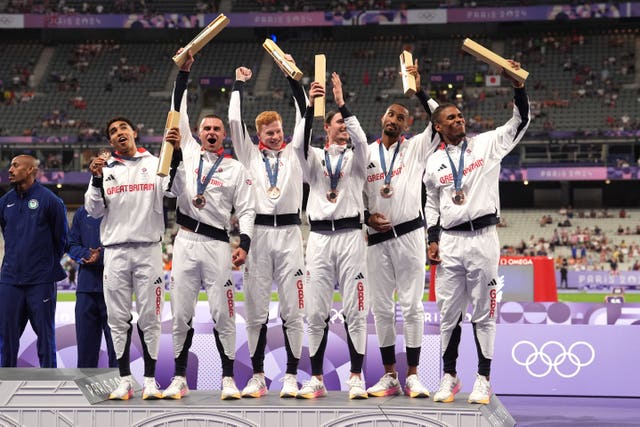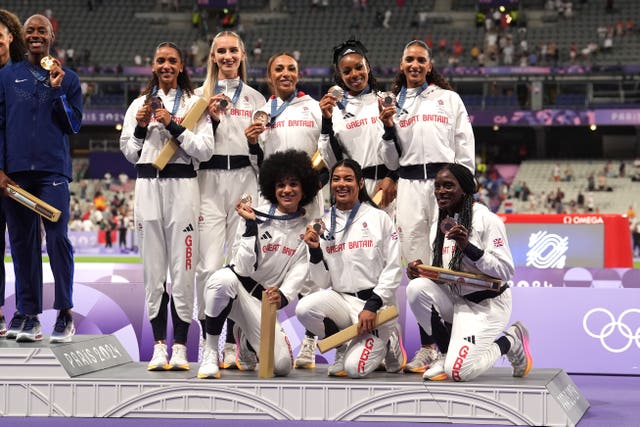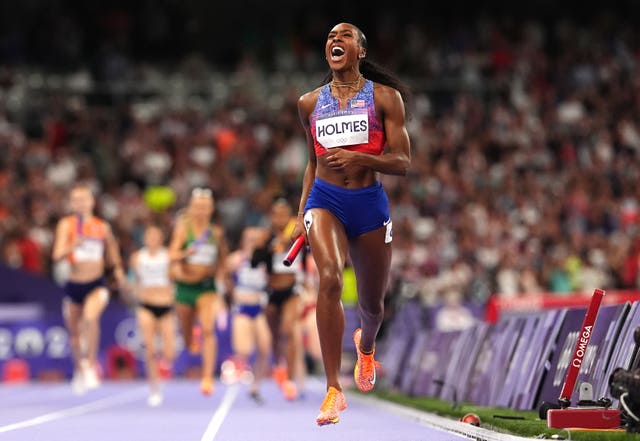Georgia Bell confessed her “unconventional route” to the Olympic podium once seemed like a “bonkers” impossibility after collecting 1500 metres bronze at the Stade de France.
Bell’s was one of three British bronzes secured on Saturday night, the first before Team GB added a pair from the men’s and women’s 4x400m to make it a perfect five medals from as many relay finals in Paris.
A medal on her Olympic debut was a remarkable achievement for 30-year-old Bell, once a prodigious youth talent who initially only took up running again to keep herself occupied during the Covid-19 lockdown.
Believe it, Georgia! ❤️ pic.twitter.com/IZqPpStuRi
— Team GB (@TeamGB) August 10, 2024
Bell, who in a fairy-tale twist was also born in Paris, said: “I’ve had so many nice messages from people, be them athletes or just parents or whatever saying, ‘You’ve inspired me to get back into an old sport or an old hobby’.
“When I got back into it, the goal wasn’t to make the Olympics, that would have seemed kind of bonkers at the time. But just keep going.
“It’s never too late to go back to something that you enjoy. I’m a happy athlete and I think anyone can take away from that, there’s no set path. Mine’s a very unconventional route.”
Kenya’s Faith Kipyegon lowered the Olympic record to 3:51.29 to claim gold and defend her title for a second time, while Australia’s Jessica Hull took silver, 0.05 seconds faster than Bell’s new British record of 3:52.61.
Bell had clawed her way up by the final lap, the last of a leading group of four on the back stretch led by Kipyegon.

Though some had predicted Tokyo silver medallist Muir might land herself on another podium in Paris, it was Bell who surged forward in the final 100 metres to beat Ethiopia’s Diribe Welteji to bronze.
She said: “I only thought this week in the heats I could medal. I started to believe that this week.
“I know that training has been going really well. And I know that I’ll never really be in this position again, where I can come into the Games with absolutely no pride. Even making it to the Olympics was huge.
“So next year will be different. I’ll be an Olympic medallist and people will be expecting things.”
When Muir stormed to silver at the Tokyo 2020 Games, Bell, only just beginning to re-lace her trainers, was watching her future GB team-mate on television.
She started with a few parkruns and was pleasantly surprised she still had the speed, so she rang up old coach Trevor Painter, who alongside Jenny Meadows also trains newly-crowned 800m champion Keely Hodgkinson, and started taking the sport seriously again.
As recently as May, Bell was still working a nine-to-five job in cybersecurity sales and a month later was crowned 1500m champion at the British Olympic trials to book her place in Paris.
She said: “Work said to me, ‘If you go to the Olympics and got a medal we still want you back and, when they said that when I left on May 1, I thought there’s no way I’ll win a medal. So I’ll see, but probably have a chat with them. Things have changed.”
Shortly after Bell kicked off the medal rush, the British quartet of Alex Haydock-Wilson, Matthew Hudson-Smith, Lewis Davey and Charlie Dobson added to the tally in a men’s 4×400 metres relay won by the United States in Olympic record time.

That advantage was quickly relinquished, and by the time Davey had handed over to Dobson both the US and Botswana had pulled well clear.
The latter secured silver after individual 200 metres champion Letsile Tebogo blitzed to the finish in 43.04 seconds, the only man with a quicker split than Hudson-Smith.
Dobson had considerable distance when he crossed the finish for a cumulative 2:55:83 to break a European record that had stood for 28 years and record the sixth-fastest time in history.
Hudson-Smith said: “I was literally on the floor after that. I couldn’t walk around the track. But honestly, we say we’re gonna fight for each other, and that’s exactly what we did.
“We fought for each other. We came over the line in the national record and couldn’t ask for anything. We put our heart and soul into that run, and it’s an amazing, amazing feeling just to come away with a team medal and deliver for our country and also for ourselves and PB.”
Victoria Ohuruogu, Amber Anning, Laviai Nielsen and Nicole Yeargin secured bronze of their own 15 minutes later, ensuring Great Britain would take home a medal from all five relays in Paris.

The Americans dominated in 3:15.27 but it was a much closer battle for the remaining places on the podium.
All five top teams secured national or area records, with the British quartet lowering theirs to 3:19.72.
Individual 400 metres finalist Anning said: “At this point it was all mental. This was more about the team. I did my part, I knew we had a great opportunity to get a medal so this is for the girls. I just wanted to get it round and it was close at the end but I just had a little bit of a surge and brought it home.
“It’s been an amazing Games, we’ve had great support, big thanks to Team GB and I’m just glad all the relay teams could come home with medals.”
Jamaica looked to be in contention, but ruled themselves out in the second leg when Andrenette Knight lost the baton after bumping into Ireland’s Rhasidat Adeleke.

Just as she had done to secure the Netherlands gold in the mixed relay, Femke Bol laid down a blistering anchor leg, this time 48.62 seconds, to snatch silver for the Dutch.
Three more medals takes the overall athletics tally for Great Britain to 10, a total that has not been bettered since 1984 in Los Angeles.
Earlier, Max Burgin finished eighth in his 800 metres final, while George Mills landed 21st in the men’s 5000 metres medal race.






